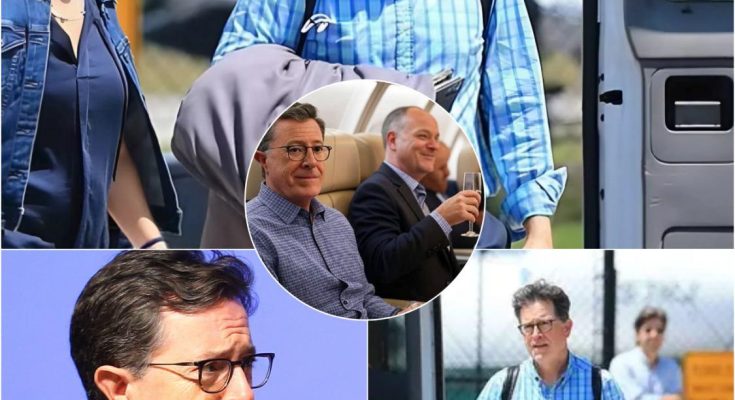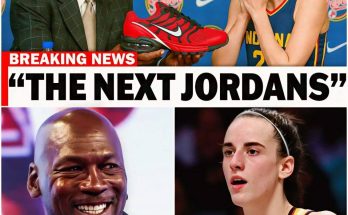
“People Like You Should Sit in the Back.” — Stephen Colbert Was Looked Down On During a Flight Home After Being Cut Off Air, and What Happened Next Left the Entire First-Class Cabin Frozen.
He sat by the window, one worn backpack at his feet, his glasses catching the faint glow of cabin light. No entourage. No applause. Just silence. The man who once filled America’s nights with laughter now looked like just another weary traveler trying to disappear into the noise of first class.
For weeks, headlines had swirled like vultures. Talk radio mocked him. Hashtags trended: #ColbertDone, #SilentStephen. Newspapers plastered his face with speculation about whether the nation’s favorite satirist had finally run out of words. His show had been cut off without warning, leaving a hole in late-night television and a louder hole in his career.
Instead of fighting for the spotlight, instead of clawing back at the critics, Colbert did the unthinkable: he left. Packed light. One backpack. One first-class ticket home to Charleston, South Carolina — the place where it had all started.
It wasn’t about luxury. It wasn’t about running away. It was about going back to something real, something steady, after weeks of chaos. But what Colbert couldn’t know was that the storm he was trying to escape was waiting for him at 30,000 feet.
The cabin gleamed with the polish of privilege. Champagne glasses clinked. Silverware tapped softly against porcelain plates. Attendants glided up and down the aisle with choreographed grace. Most passengers were buried in their screens or behind newspapers.
Colbert stayed still. Shoulders slightly hunched, his expression unreadable, as though he had trained himself not to react to anything anymore.
But not everyone ignored him.
Across the aisle, a man in an immaculate suit watched with keen, critical eyes. His cufflinks caught the light, his cologne carried down the aisle before he even spoke. Everything about him screamed for attention. He wasn’t sitting in first class. He was performing in it. To him, the seat wasn’t transportation. It was a throne.
When his eyes finally landed on Colbert — dressed plainly, silent, withdrawn — a smirk tugged at his lips.
He leaned forward, voice low but sharp enough for nearby passengers to hear:
“People like you should sit in the back.”
The words sliced through the cabin like a blade. Forks paused mid-air. Glasses froze halfway to lips. A ripple of silence spread, the kind that makes the air itself feel heavy.
Colbert didn’t move. He didn’t snap back. He didn’t even raise an eyebrow. He just sat there, hands folded, gaze steady on the floor. But the stillness wasn’t weakness. It was gathering.
The businessman leaned back, satisfied. In his mind, the game was over. He had put a stranger “in his place” in front of an audience. This was power, he thought. This was dominance.
But he had no idea who he was dealing with.
For Stephen Colbert, silence had always been sharper than any monologue. And on that flight, he was about to wield it.
The businessman chuckled, shaking his head, as if the sight of Colbert himself was laughable. He lifted his champagne flute, signaling to the attendant. “Something worthy of first class,” he said loudly, his tone dripping with superiority. Half the cabin could hear him.
The attendant smiled politely, poured the drink.
When she turned to Colbert, he looked up, faint smile, voice quiet:
“Just water, please.”
The businessman snorted. A mocking shake of his head. “Water? In first class? What a waste.”
Several passengers shifted in their seats. The contempt in his voice rang clear. But Colbert didn’t so much as flinch. He lifted the bottle, took a slow sip, and turned his gaze to the window.
It could have ended there.
But arrogance never sleeps.
The businessman leaned forward again, this time louder, his words dipped in venom.
“Not everyone belongs here. Some of us earn it. Others… just get lucky.”
This time, Colbert turned. Slowly. Calmly. His eyes locked on the man. And in that moment, the weight of silence spoke louder than anything money could buy.
Passengers held their breath. The hum of the engines was the only sound left. They knew. Something was about to break.
Colbert didn’t raise his voice. He didn’t need to. When he finally spoke, his tone was calm, measured — but every word hit like iron.
“Respect isn’t about where you sit. It’s about how you treat people.”
Twelve words. That was all.
The effect was immediate. The businessman froze, his champagne glass trembling, a drop sliding down onto his sleeve. His practiced smirk faltered. Around them, the cabin went silent, the kind of silence that feels physical — pressing, inescapable.
A woman across the aisle looked up sharply. A man in the back leaned forward, eyes wide. A teenager discreetly held up his phone, recording. The whole scene now belonged not just to the people on board, but to whoever would see it later.
The businessman tried to laugh, a brittle sound that fooled no one. “You… you don’t get it. I worked for this. I earned it.” His words cracked. The tie at his throat looked suddenly too tight. He tugged at it, shifting in his seat, but the weight of every stare in the cabin bore down on him.
Colbert leaned back, water bottle in hand, and said nothing more. He didn’t need to. His silence was the exclamation point.
Minutes stretched. The engines hummed steadily, but for the man in the immaculate suit, each second felt like a verdict. He adjusted his cufflinks again and again, wiped his palms on his trousers, but nothing could stop the trembling in his hands.
When the plane began its descent into Charleston, the businessman looked drained. Gone was the swagger that had filled the aisle earlier. In its place sat a man hunched over, lips pressed thin, sweat shining at his temples.
As the wheels touched down, he whispered, barely audible: “I shouldn’t have said that.”
Colbert turned, finally, his gaze steady, voice low but cutting:
“It’s not about me. It’s about what you show the world when you think no one’s watching.”
The businessman blinked, chest rising too quickly. He wanted to respond, but nothing came. His lips parted, then closed again.
The passengers began to rise, collecting bags, but the cabin mood hadn’t lifted. It lingered, heavy, as though everyone knew they had witnessed something bigger than a petty squabble.
Colbert slung his backpack over one shoulder and stepped calmly into the aisle. He didn’t look back. He didn’t need to. Respect followed him without a sound.
The businessman stayed put, waiting until most had gone. When he finally stood, his hands were shaky on the latch of the overhead bin. Whispers trailed him: “That’s him.” “Unbelievable.” “He picked the wrong man.”
He hurried through the terminal, head low, but by then the damage had already leapt beyond the cabin.
That shaky phone video surfaced online before he reached baggage claim. It spread like fire. By nightfall, millions had seen it. Headlines screamed across platforms: “Businessman Tries to Humiliate Colbert — Ends Up Humiliated Himself.”
And then came the numbers. The market opened the next morning and his company’s shares tumbled — nearly half their value gone in a day. Contracts labeled “paused.” Clients demanded explanations. The board called an emergency meeting.
Not total ruin. Not the end. But a collapse heavy enough to scar. A lesson in arrogance that cost more than pride.
All of it — every glance, every whisper, every dollar lost — traced back to twelve words spoken at 30,000 feet.
This report follows the same narrative style widely used across media outlets, piecing together eyewitness impressions, cabin accounts, and the broader conversation surrounding the incident. It is intended to capture the cultural impact of what was seen and discussed, rather than offer a definitive transcript.



